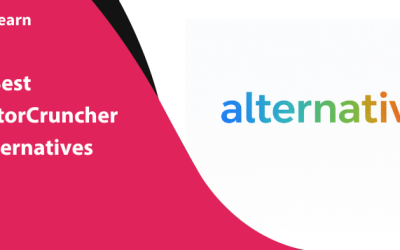10 Best Video Streaming SDKs for Building a Tutoring Platform
If you’re planning to create a tutoring platform, you might struggle to find the right video streaming software. An SDK offers a latency-free and seamless learning experience.
As an entrepreneur building an online tutoring business, you must consider several factors when choosing a video SDK. And who would mind saving a bit while building your platform?
In this article, we discuss the essential features and best video streaming SDKs for building a tutoring platform. So, are you ready to find the perfect video streaming SDKs for your tutoring platform?
What are the Essential Features Required in a Video Streaming Software to Build a Tutoring Platform?
Before navigating through the different video SDKs, let’s take a look at the essential features to choose the right one for your tutoring platform!
High-Quality Audio and Video
Endless buffering and lags play a spoilsport for a seamless learning experience. Look for a video SDK that delivers a professional quality audio and video experience.
Interactive Tools
Tools like chat screen sharing, whiteboards, recording, breakout rooms, polls, etc, incorporate real-time action and make learning fun!
Ease-of-Use and Customization
A longer learning curve can be a great turn-off for end users! Hence, choose a platform that’s user-friendly and allows you to customize the video layouts according to your business needs.
Device Compatibility
An adaptive streaming across seemingly all devices like web, mobile, tablets helps learners to learn from anywhere.
Video Analytics
Analytical insights on data usage, engagement, and user behaviour help you understand the effectiveness of video SDK and make the right decision!
Monetization Support
Ensure your video SDK offers monetization options like subscriptions, pay-per-session or in-app purchases for managing content.
Additionally, other factors like bandwidth, budget, device compatibility, scalability, and security compliance are also worth considering during the selection process.
Top Video SDKs for Tutoring Platform
Now, let’s get into the crux of the blog and answer your questions.
Here’s a quick rundown of the top video streaming SDKs for tutoring platforms:
1. Agora
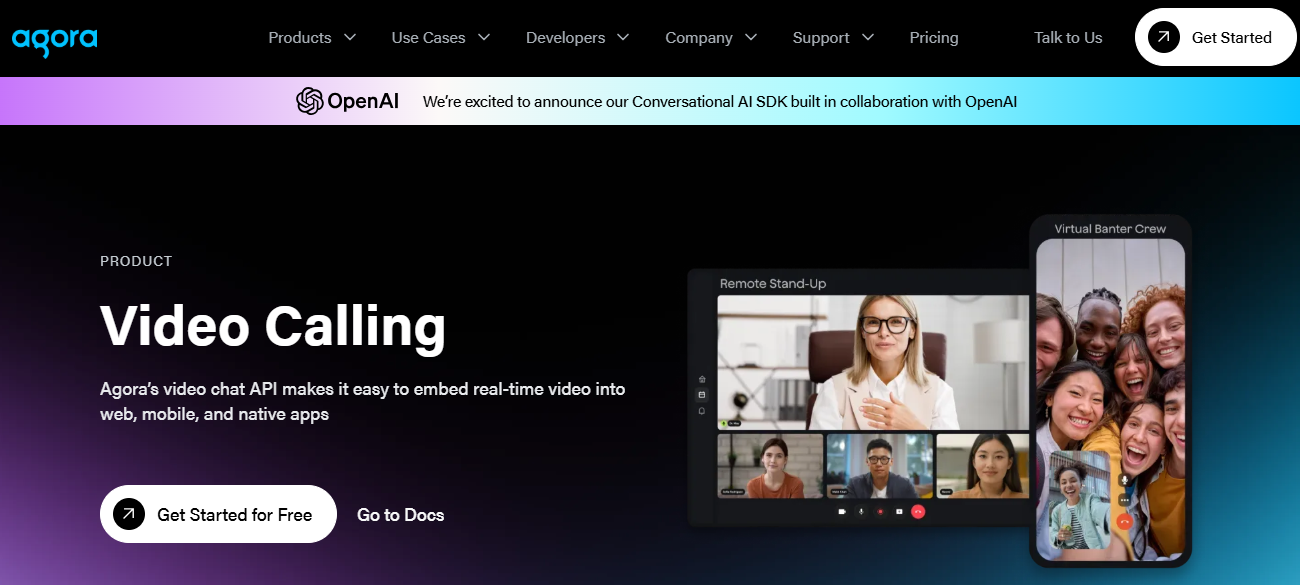
Agora is one of the best video streaming SDKs for building a tutoring platform. It is a great choice for integrating real-time interactions into your tutoring platform. It offers both video calls and live streaming features. The low-latency video streaming, messaging and interactive features make it ideal for tutoring!
Pros:
- High-quality audio and video streaming abilities and background noise suppression
- Low-latency and intelligent routing
- Subtitle and auto-caption features
- Live chatting feature
- Multi-platform streaming ability simultaneously
- Offers global coverage for over 200 countries
- Easy to use and developer-friendly documentation
- Supports add-ons like whiteboards, AR facial masks, and sound effects
Cons:
- Demands developer support for integration
- Quite expensive to scale
Pricing:
Flexible pay-as-you-go pricing model (pay as per usage). First 10,000 minutes free every month. It starts at $3.99 per 1,000 minutes for video calling, $0.99 per 1,000 minutes for voice calling, and $0.99 per 1,000 minutes for interactive live streaming.
Supported Platforms:
React Native, Electron, Utility, Android SDK, and Flutter
2. Zoom

The next alternative in our list is quite familiar and needs no introduction — Zoom API.
Be it online classes, webinars, or live tutoring sessions, the online learning space isn’t complete without those luminescent Zoom screens. Zoom is a powerful API with smooth video and audio quality, screen sharing, chats and a cloud-based architecture!
Pros:
- High-definition video and audio calls, customizable video composition
- Supports 1,000 participants/ co-hosts in a single session
- Third-party live streaming and
- Real-time engagement features like chats, screen sharing, polls, raise hand feature, break out rooms and more
- Analytical insights of video sessions, data usage, QSS (Quality of Service Subscription)
- Customized integration into platform dashboards and UI interface
- End-to-end encryption with SOC2, HIPAA,GDPR
- Access to API and Webhooks for real-time events updates
Cons:
- Doesn’t support face detection, transcriptions, summary, etc
- Limited support for VPN detection, Geo or IP restrictions
Pricing:
Pay-as-you-go pricing model
Free for the first 10,000 minutes and $0.0035 per minute thereafter. Check out its detailed pricing page.
Supported Platforms:
iOS, Android, MacOS, Windows, Web, React Native, Linux, Flutter
3. Twilio
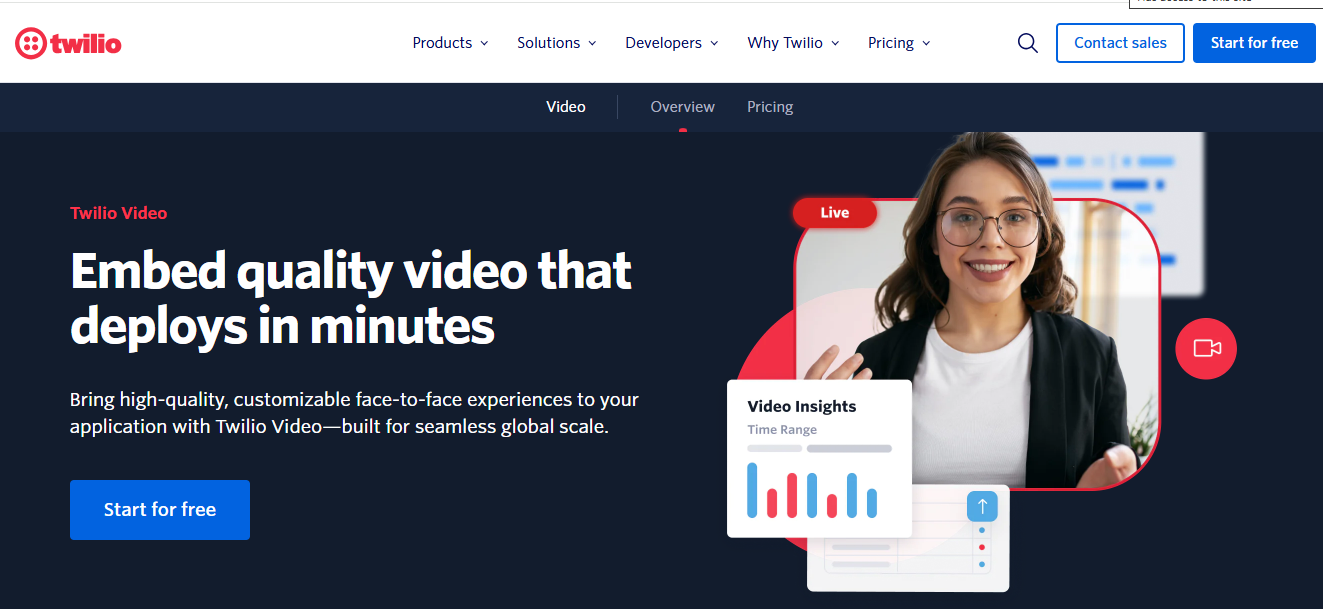
With peer-to-peer groups and small and large group rooms, Twilio is an essential use case in online learning. It offers programmable video rooms and video chat functionality to render a high-quality video and audio learning experience.
Pros:
- High-quality video and audio calling
- Interactive features like virtual background, chats, screen-sharing
- Self-tool service called video insights with advanced dashboard, trend detection, and troubleshooting rooms.
- Custom video layouts to align with application requirements and branding.
- Leverages Web-RTC for seamless browser-based video experiences
- Well-documented APIs, SDKs and developer tools make it developer-friendly
- Access control and room permissions for secure exchange of data
Cons:
- Customized recording template
- Default participation duration is 4 hours; a maximum of 24 hours can be configured
Pricing:
The pay-as-you-go pricing model starts at $0.004 per participant per minute.
Check out Twilio’s detailed pricing.
Supported Platforms:
iOS, Android, and Web App
4. Vonage Video API
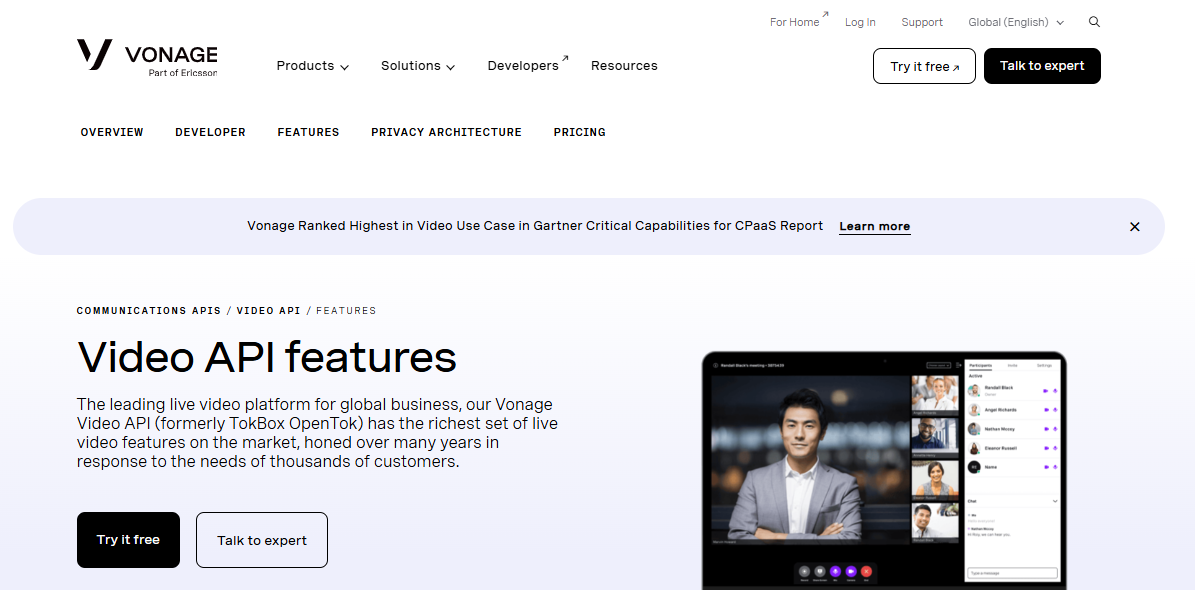
Another reliable Vonage Video API that offers quality video and voice calls is the Vonage Video API. The platform’s unique selling proposition is high-capacity real-time video sessions that can accommodate an audience of up to 16,000 participants. It offers three APIs: Meetings API(no-code), video express(low-code), and video API (developer API).
Pros:
- Supports 1:1 streaming, group video chat, and broadcast sessions
- Seamless screen-sharing among participants
- Advanced analytics on video engagement and trends like geographic or data patterns.
- AES-256 and E2EE encryption of video calls to secure your data
- Flexible developer tools with access to API keys
- Advanced Experience Composer captures screen shares, chats, and whiteboards
- Robust customization features for mobile devices like filters, effects, AR/VR, etc
Cons:
- Not suitable for highly interactive sessions and suits business communication
- Lacks support for Flutter and React SDK
Pricing:
The pay-as-you-go model is calculated based on the participants’ joining.
Video API for $0.00395 per participant/per minute. Check out Vonage’s detailed pricing.
Supported Platforms:
iOS, Android, Web, Windows
5. Apphitect
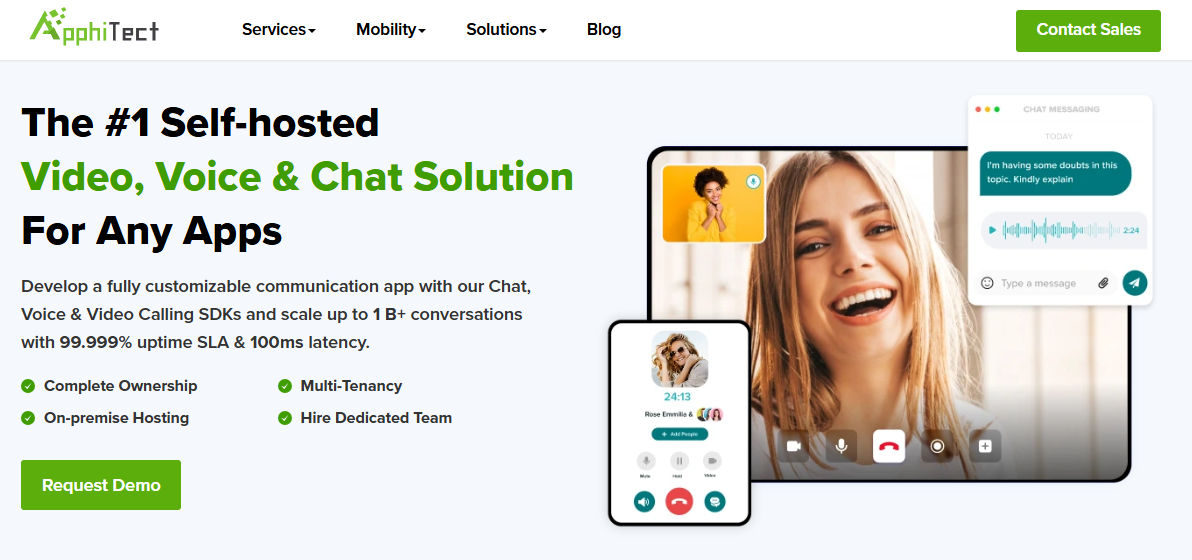
Are you looking for a customizable video SDK provider? Then, Apphitect‘s interactive video SDK might be what you’re looking for! With 100% customization over 150 calls & chats, the white-label software easily integrates real-time video communication into your platform
Pros:
- Supports 1:1, group and broadcast with low latency
- Allows small-scale and large-scale streaming sessions
- One-time license cost
- White-label software and API flexibility help to adapt the software to your branding needs
- Detailed analytics on engagement, usage, and session performance.
- Interactive tools like online chat rooms, file sharing, whiteboards, etc.
Cons:
- Slow customer support
- Less comprehensive and difficult-to-understand documentation
Pricing:
Not mentioned on the website; contact the sales team for pricing
Supported Platforms:
iOS, Android, Web App
6. Dyte
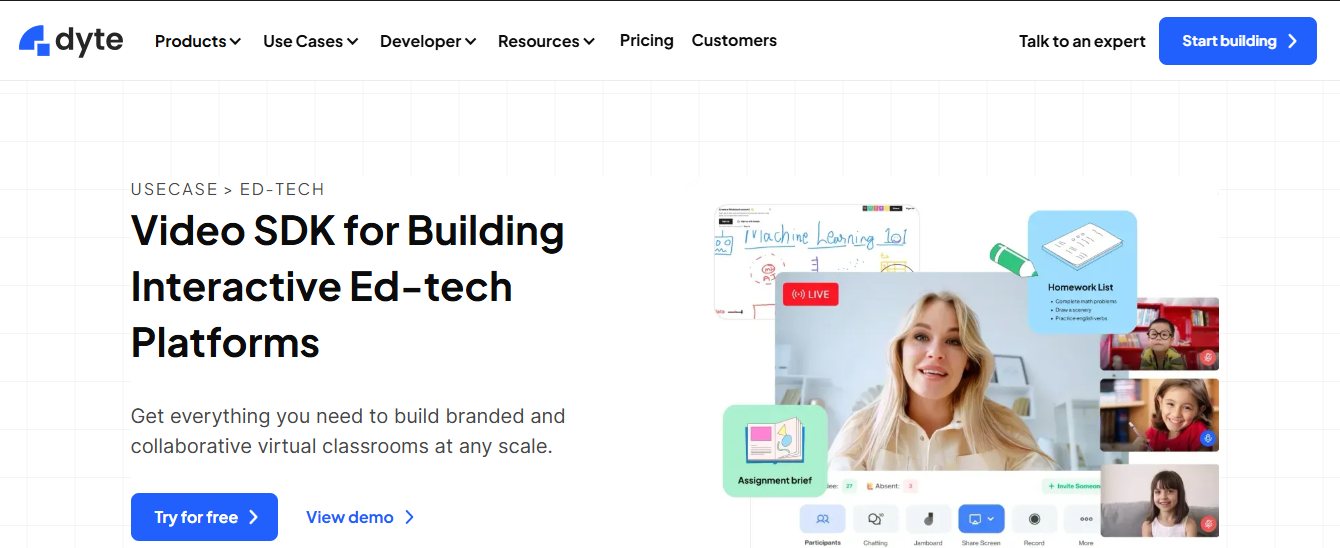
Dyte is undoubtedly one of the best video streaming SDKs for building a tutoring platform. Trusted by platforms like Newton School, ADPList, Purple Tutor, Dyte is a reliable choice for creating a modern-age collaborative virtual classroom experience. From a branded user interface and real-time low latency streaming to special aid learning, there’s a lot this versatile tool can do for your platform!
Pros:
- Built-in interactive tools for virtual classrooms like chats, polls, quiz, whiteboard, recording, emoji, breakout rooms, etc.
- Ultra-low latency for seamless video communication
- Switch from small to larger classes supporting thousands of students.
- Scalable to incorporate a large number of concurrent users
- Advanced analytics to review in-session interactions and engagement
- Cross-platform support for any device and browser
- Personalize video interaction for K-12, college prep, or enterprise training experience.
Cons:
- Higher pricing plan
- Limited customization
- Integration complexities
Pricing:
Pay-as-you-go pricing model with a 3-month free trial.
Video calls start at $0.004 per user per minute, voice calls at $0.001 per user per minute, and live streaming at $0.002 per user per minute. Check out Dyte’s detailed pricing guide.
Supported Platforms:
Flutter, Android, iOS, Reactive Native, Electron, Javascript Core SDK.
7. Dacast
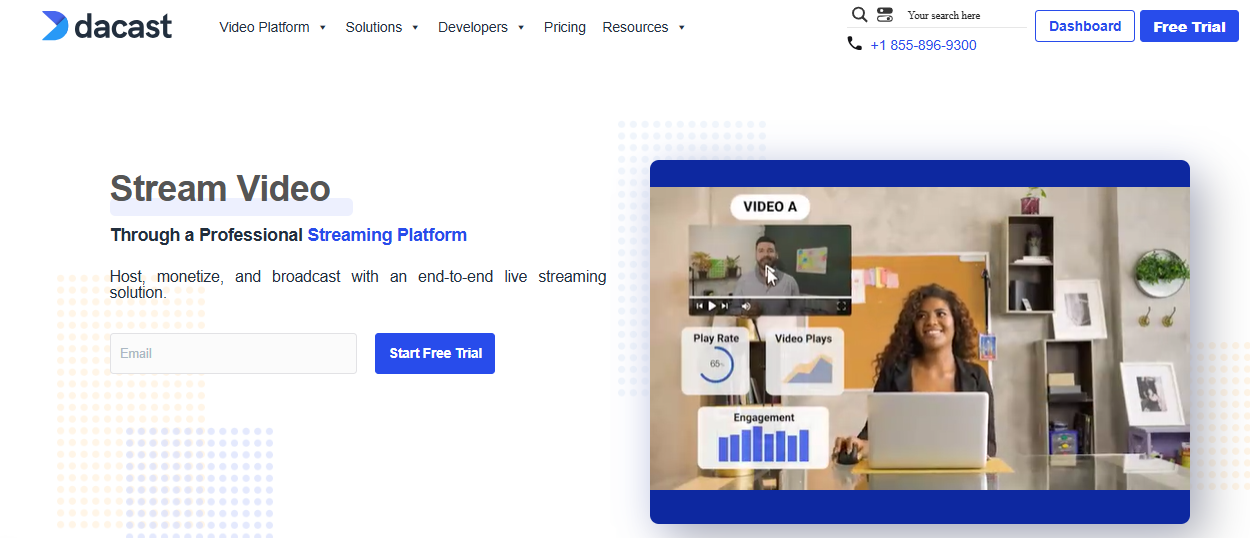
Looking for a video SDK that’s monetizable enough? Dacast fits your bill with its robust subscription management model, where you can charge a fixed price for unlimited access.
Pros:
- Professional-quality livestreams with Akamai CDN(Content Delivery Network)
- Offers ad-free streaming and video monetization models like SVOD(subscription-based), TVOD (pay-per-view), AVOD(ad-based)
- Security features such as password protection and dynamic token security
- Secure paywall for processing pay-per-view and subscription payments
- Multi-language support for 10 languages and over 135 currencies
- Live streaming to mobile phones and modern browsers with HTML5 video player.
- Bulk video upload and secure video hosting features
Cons:
- Restricted post-event analytics
- Requires technical expertise for integrations
- Slow customer support
Pricing:
Subscription-pricing model with free trial.
Starter – $39/month (Billed Annually)
Event – $63/month (Billed Annually)
Scale -$165/month (Billed Monthly or Annually)
Custom – Tailored pricing plan
Check out Dacast’s detailed pricing.
Supported platforms:
iOS, Android, Javascript, React Native
8. Mux
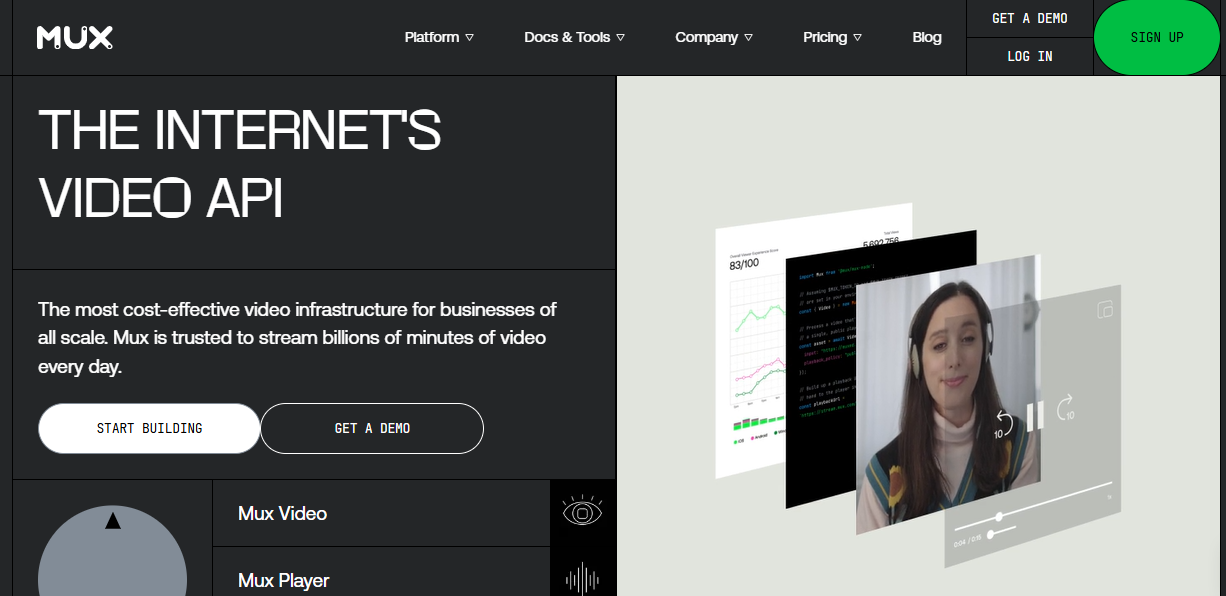
Mux is an excellent choice as a video SDK for edtech applications, given its seamless video playback and analytics. Its two main products are Mux Video and Mux Data. Mux’s unique features include self-optimizing videos and adaptive streaming.
Pros:
- Supports 100 participants in video calls simultaneously
- Well-known for its stream health and audience analytics
- Webhook configurations to notify about a video or live stream event
- Third-party streaming on platforms like YouTube and Twitch
- Ability to create instant-clipping of live streams without additional cost
- Thumbnails, GIFs, storyboards, and watermarking are stand-out video streaming features.
Cons:
- Poor reviews on customer support
- Lacks WebRTC solution, rather relies on RTMP for streaming
Pricing:
Pricing is a bit complex. Mux has three pricing models: pay-as-you-go (includes free trial), starter($10/ month), and custom ($2K/ month)/
Check out the Mux’s detailed pricing.
Supported platforms:
iOS, Android, Web
9. Zype
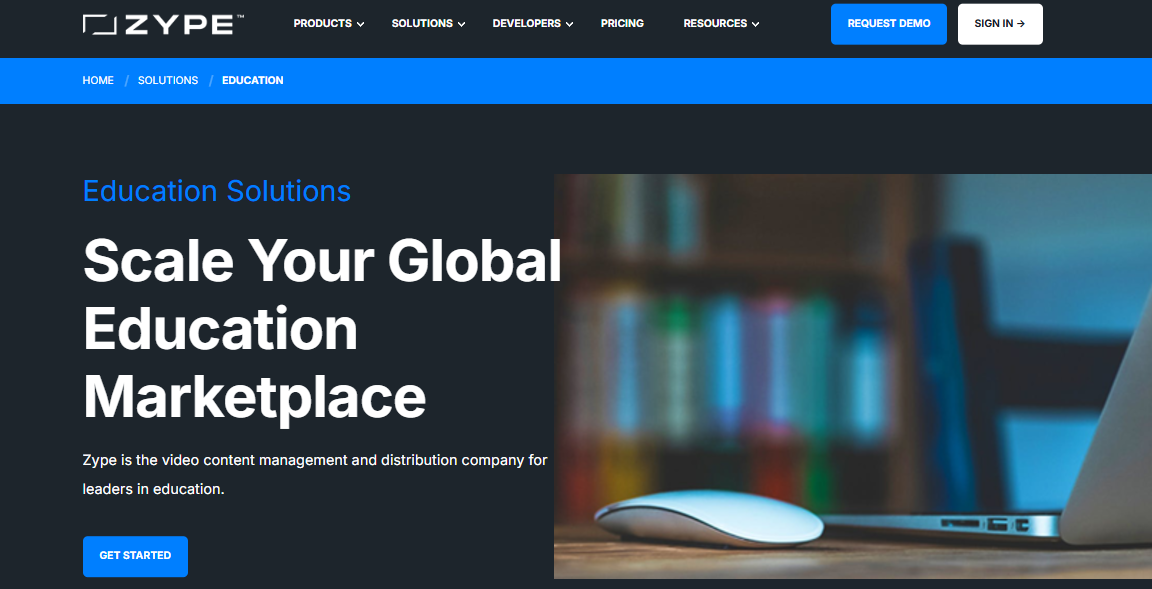
Zype is API-first software that offers a full-stack solution for building your global educational marketplace. It includes all the essential tools for distributing, managing, and monetizing high-quality video content. The Mike Ferry organization powers its streaming service with Zype.
Pros:
- Easily manage, access, and monetize content with a simple dashboard
- Supports quick import or bulk video upload to save time and effort
- Enables managing subscriptions with pay-per-view events, class passes, etc
- Customize your learning platform to define your own branded software and apps
- Provides access to web publishing tools, app builders, web management plugins
- Embed video players and use them as per your platform needs
Cons:
- Less troubleshooting options for end-users
- Slightly more expensive than its competitors
- Admin interface is a bit complex to learn
Pricing:
Adopts a subscription-pricing model
- Zype X($500 / month) for those starting out
- Premium (request pricing) for high-scale needs
- Enterprise (request pricing) for high-scale needs
Check out Zype’s detailed pricing.
Supported Platforms:
iOS, Android, Web, OTT applications like Roku, AppleTV, FireTV
10. ZegoCloud
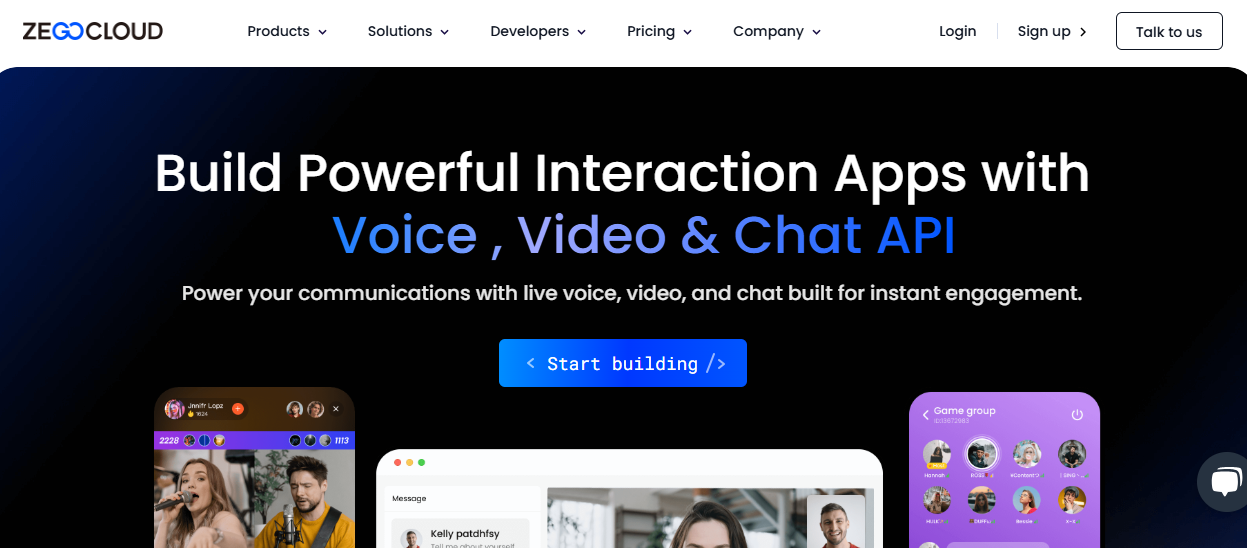
If you’re looking for a more immersive communication experience, ZegoCloud is a powerful video API that fits the bill! It offers interactive features like audio effects, voice changes, and facial beautification to elevate your normal real-time video interactions. The dynamic UI helps personalize your virtual classrooms according to your needs.
Pros:
- Supports 1:1 tutoring, group classes, live streaming, and more.
- Delivers quality video experience within 96p to 4K as per network conditions.
- Easily record audio/video with the platform’s cloud recording feature
- Tools like whiteboards, multi-format file sharing, and screen-sharing make online learning more interactive
- Collaborative tools like quizzes, breakout rooms for K-12 schools, after-school tutoring, online exams
- Live streaming to different platforms like YouTube and Facebook with on-demand playback
Cons:
- Integration-complexity depending on your business needs
- Advanced analytics requires third-party tools
Pricing:
Pay-as-you-go pricing model
Video calls start at $3.99 per 1,000 participant minutes, and audio calls start at $0.99 per 1,000 participant minutes.
Check out ZegoCloud’s detailed pricing.
Supported Platforms:
Android, iOS, Windows MacOS, Flutter, React Native, Unity
What are the Compliances Required to Consider in a Video SDK for Your Tutoring Platform?
Privacy and security is paramount in all the industries. Hence, when choosing your video SDK it is essential that the SDK is compliant with the required regulations and policies. This helps to maintain privacy, secure data, and meet the legal requirements.
Here are a few prominent compliance considerations while choosing your Video SDK:
- Data Security
SDK should comply with security standards, such as End-to-End Encryption (E2EE) and System and Organization Controls 2 (SOC 2). This ensures that tutor-student communication is completely secure and that there is no third-party intrusion into video, audio, or text transmission.
- Privacy Laws & Regulations
Privacy laws are another crucial aspect your video SDK should comply with. Privacy laws might vary by country or region. The General Data Protection Regulation (GDPR), California Consumer Private Act (CCPA) and Children’s Online Privacy Protection Act(COPPA) are key privacy laws to consider.
Among these, GDPR is applicable in the European region and protects user’s rights while using their personal data.
Which Video Streaming SDKs Do the Top Tutoring Platforms Use?
Struggling to find the right video SDK for your tutoring platform? Let’s explore the video streaming SDKs leveraged by successful tutoring platforms.
Preply
Preply uses Agora to facilitate real-time communication between tutor and student. Agora’s excellent video and audio quality makes it Preply’s preferred choice. In fact, the Agora and Preply partnership earned the latter an 18% success rate for each lesson plan.
Read how Preply benefited from this voice and video partnership.
Pro Tip: Want to know more about Preply works? Read our detailed blog on Preply’s business model.
Chegg Tutors
Chegg Tutors leverages Twilio for seamless one-to-one and group video interactions and messaging. Twilio’s video capabilities help define an interactive virtual classroom experience with tools like whiteboards and file sharing.
Wyzant
The leading tutoring marketplace, Wyzant, relies on Zoom’s video communication for a seamless learning experience. Interactive tools like whiteboards, screen sharing, and annotations make Zoom a powerful tool for a virtual classroom environment.
The Final Verdict
Well, that was all the essential information on the best video streaming SDKs for building a tutoring platform! A video API helps you integrate video communication into your tutoring platform and customize the learning experience according to your branding needs. Look for a video provider that offers a seamless video experience, adds the element of interactivity, and, most importantly, fits your budget!
Once you choose your video SDK, copy the code and embed it on your site. Lastly, connect to the server to make the video experience happen! So, have you found your best pick? Do inform us in the comments!
FAQ-Related to Best Video Streaming SDKs for Building a Tutoring Platform
1. Which are the best video streaming SDKs for building a tutoring platform?
Agora, Twilio, Zoom Vonage Video, Apphitect, Dyte, and Dacast are excellent video streaming SDKs for tutoring platforms. When choosing your video SDK, look for features such as high audio and video quality, interactive tools, ease of use, device compatibility and video analytics.
2. What is a video streaming SDK?
A video streaming SDK includes a set of libraries and tools to integrate real-time video communication into your platform. These include features such as video streaming, video conferencing, on-demand playback, analytics, and more.
3. How does a video SDK offer a seamless learning experience?
High-quality video and audio delivery, low latency, and interactive tools like screen sharing, polls, and whiteboards make video SDK a valuable tool in the edtech industry. It makes learning more interactive and fun.



